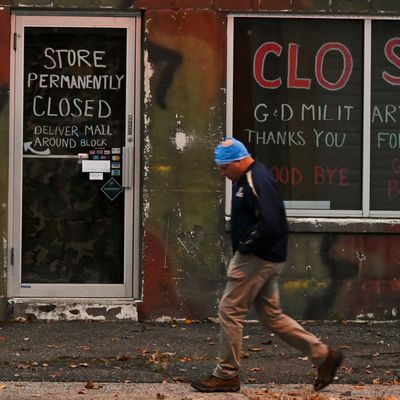
Over the past few weeks, the number of Americans hospitalized for COVID-19 has doubled. Weekly deaths and cases are at all-time highs. Major U.S. cities are now contemplating full economic lockdowns. And Congress still has not passed legislation extending economic relief to small businesses, needy households, and the unemployed — or funding vaccine distribution.
But that might be about to change.
This week, Congress must pass a new spending resolution in order to avert a government shutdown on Friday. A bipartisan group of lawmakers hopes to append a COVID stimulus bill to that broader spending package, ensuring that Americans secure relief before Congress departs for the holidays.
Those lawmakers reached agreement around a $908 billion framework for such a bill earlier this month, and Democratic leaders in the House and Senate endorsed its general parameters. The package would instate a $300-a-week federal unemployment insurance benefit, roughly $300 billion in new funding for forgivable loans to small businesses, $160 billion in fiscal aid to states and cities, and tens of billions for rental assistance, food aid, schools, transportation, and vaccine development, among other things. It would also establish a temporary liability shield that would immunize businesses against certain kinds of COVID-19 related lawsuits from workers and consumers.
A significant portion of conservative Republicans are averse to further government aid of virtually any kind, while others would prefer bailouts for small businesses and nothing else. But a good number have signed onto the bipartisan framework, while others expressed comfort with the bulk of its provisions — except for the aid to state and city governments. The COVID pandemic has not hit the finances of all states equally. Contrary to GOP rhetoric, it has also not targeted “poorly run” blue states for fiscal devastation. Some of Congress’s leading advocates for state aid are Republicans from red areas that have had their budgets busted by the pandemic, such as Louisiana and Mississippi. Nevertheless, conservatives from states that have weathered the crisis with minimal budget problems — or who are perfectly comfortable forcing their home states to “starve the beast” — have decided to brand fiscal aid as “blue-state bailouts,” making the policy a punching bag for right-wing media.
On the other side of the aisle, Mitch McConnell’s desired liability shield is similarly toxic, as many Democrats do not like the idea of taking away one of the few remaining tools that workers have to protect themselves from workplace abuse in the middle of a pandemic, in which managerial negligence has been widespread and often fatal.
In deference to these disparate sources of opposition, the authors of the bipartisan package will announce Monday that they’ve split the package in two — a $748 billion relief bill with all funding items except the $160 billion in aid to local governments, and another with that provision plus the liability shield. West Virginia Democrat Joe Manchin told Politico that he hopes his colleagues don’t take “the easy way out” by only voting for the first part of the bill. But the negotiators decided it would be better to hive off the controversial bits to avert the possibility of total legislative failure. Notably, even if state aid is left out of the final legislation, the rest of the bipartisan package does include funding for some state-level public services, such as transit and education (the former being of special concern to Senate Minority Leader Chuck Schumer).
House Democrats appear comfortable with the compromise. House Majority Leader Steny Hoyer told CNN Sunday that although state and local aid is “critically important,” other relief provisions are “critically important, too.”
“If we can get that, we want to get it, but we want to get aid out to the people who are really, really struggling and are at great risk,” Hoyer told the network. “Life is a series of trade-offs and gives and takes, but we need to make sure that we get the very important health, unemployment, small business, vaccine delivery dollars, school dollars, child care dollars, all of which are in the agreement that has forged — the bipartisan agreement forged by the senators, and by the Problem Solvers in our own House, and by members in both the House and the Senate.”
Mitch McConnell had previously proposed putting the liability shield and state aid issues to the side. But he had also been pushing a bill more austere than even the $748 billion compromise. Meanwhile, Senators Bernie Sanders and Josh Hawley are vowing to block any stimulus package that does not include another round of $1,200 relief checks — and on Sunday, President Trump suggested that he endorses their mission. “Right now, I want to see checks — for more money than they’re talking about — going to people,” Trump told Fox News’ Brian Kilmeade.
The White House had previously proposed providing $600 relief checks to all Americans below a certain income threshold instead of providing $300-a-week to the unemployed. Relief checks have the advantage of getting support to more people who are outside of the labor force, such as children, caretakers, the elderly, and the disabled — populations that are uniquely vulnerable to poverty. For this reason, some research indicates that checks would do more to relieve poverty than a $300 federal unemployment benefit, even though the latter provides much more significant relief to its beneficiaries. But there is no reason why these two policies should be put in competition. Both are indispensable for helping Americans through the darkest winter in their nation’s modern history.
Ultimately, McConnell and Nancy Pelosi have the power to decide what legislative proposals do and do not get a vote. The bipartisan package is thus a mere suggestion that the Senate Majority Leader can take or leave. But as hospitals fill up and small businesses shutter, the costs of inaction may be too high for McConnell’s caucus to bear.






























